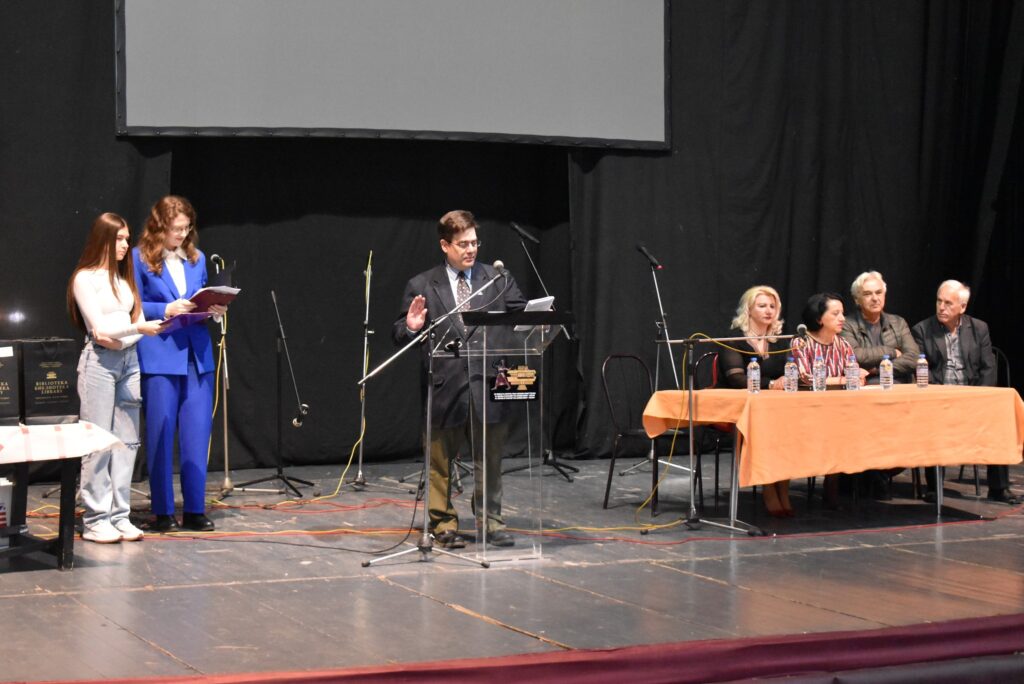I’ve been in service for some months now, so it’s time to update everybody on what I’m doing.
For those who are new here, I’m a community development volunteer in the Peace Corps. I’ve been assigned to two workplaces: the Language Center at South East European University and the Center for Equal Opportunities “Mollëkuqja” (“Ladybug,”) a group that works against sex discrimination.
At the university, I’ve been teaching about American culture. My first presentation was something of an overview of the USA as a diverse nation of immigrants, but my counterpart wanted to have more of a language focus. After all, I am teaching students who are learning English.

So I came up with a new presentation that focuses on words and phrases that derive from American culture. Many of them are terms that utterly confuse native speakers of English who are unfamiliar with American culture.
For example, Americans will say “take a rain check” to mean to postpone plans to an indefinite future date. This comes from a voucher called a “rain check” that would be issued to people who had paid for admission to a baseball game that got rained out. The “rain check” could be used for free admission to a future game. Also, “jump on the bandwagon” comes from an old American practice of politicians hiring bands to perform from horse-drawn wagons to go into a town to attract attention for the campaign. Now we use the phrase to mean becoming enthusiastic about anything as it is becoming popular.
I’ve ended the classes by saying, “Elvis has left the building.” The class laughs at that, so apparently they learned the meaning of the phrase from earlier in the lesson.
There are a whole lot of English classes being taught at the university, so I can keep giving the same lesson to many classes without repeating it to anyone.
At Mollëkuqja, I’ve been mentoring new journalists. The organization has a website with Albanian-language journalism on it. Recently, they took on three volunteers, all people in their 20s, who have an interest in journalism. I gave them an introduction in English for how to report and write news.
Now they’re consulting with me to get advice about the stories they’re working on. In one case, I told a volunteer that it would make sense to break out an aspect of the main story into a sidebar. Thankfully, the volunteer thought to ask me what a sidebar is. I then gave an explanation of this concept to all the volunteers.
Eventually, the stories will be submitted to me to edit in English. Then they’ll be translated into Albanian and posted online in both languages.
You might think I was sent to this country specifically because of my journalism background, but no. I asked and it turns out it was just a coincidence that I got sent here. But when the Peace Corps North Macedonia staff saw my resume, they got really excited and planned for me to be assigned to Mollëkuqja.
Really, this is something the Peace Corps ought to change. There are plenty of people with extensive work experience who pick the “serve where you are needed most” option instead of applying to a specific assignment in a specific country. It would make a lot of sense to have a bunch of different categories of experience. Then the Peace Corps staff in a country could request someone with (for example) accounting or bookkeeping experience. And if someone with that experience is in the system, that person gets invited to the country that needs it. This would make a lot more sense than relying on dumb luck.
In addition to my official assignments, I’m doing other work. For example, I’ve been helping the American Corner Tetovo. A while back, I helped them run an English-language spelling bee for kids in elementary through high school grades. Last week, they asked for help from Peace Corps volunteers to judge an English-language poetry contest for kids. I was one of four volunteers who judged the poems and I gave a brief speech at the ceremony on Tuesday, April 25, where the awards were presented.
In my speech, I noted that in the first 100 years of the country, the USA was known far more for its technological innovations like the electric telegraph than for anything cultural. I said there was an American who noted this and wrote, “If the United States haven’t grown poets, on any scale of grandeur, it is certain that they import, print, and read more poetry than any equal number of people elsewhere — probably more than the rest of the world combined. Poetry (like a grand personality) is a growth of many generations — many rare combinations. To have great poets, there must be great audiences too.”
The American who wrote that, I said, was Walt Whitman, one of the first Americans to gain global acclaim for poetry. I named a number of famous American poets who followed Whitman, but noted that most of them had the advantage of writing in their native language, unlike the students in the contest who had the handicap of writing poetry in a second language.
The speech was well received. It’s remarkable how many people comment on how clearly I speak American English. It seems my experience in radio news is really coming in handy.